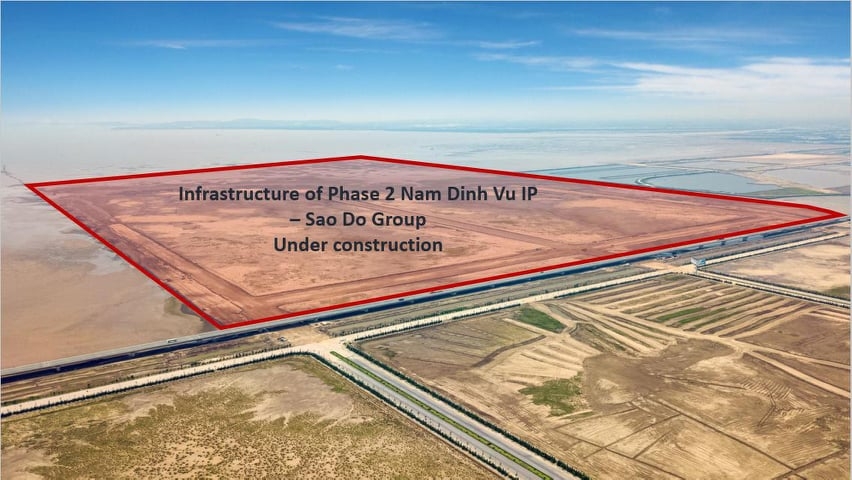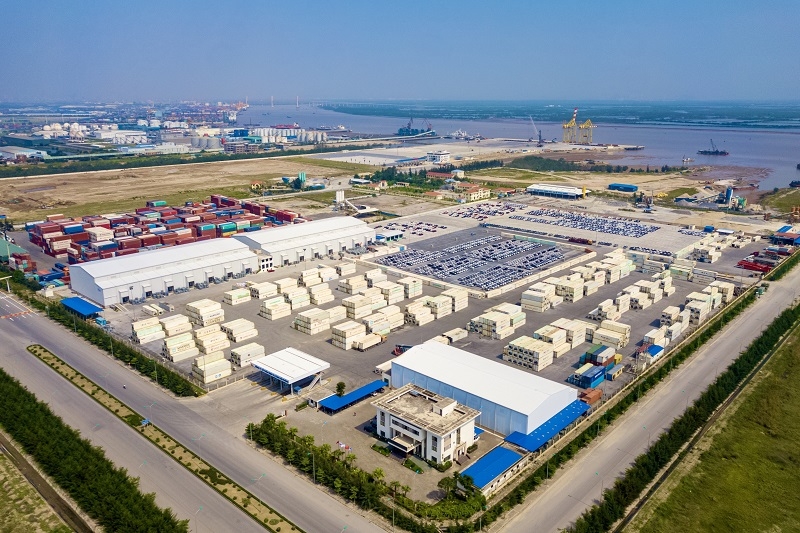Focusing on technology transfer in attracting new wave of FDI capital
 |
| Infrastructure of Nam Dinh Vu Industrial Park phase 2 is under construction |
This was emphasized at the second Industrial Real Estate Forum held by the Central Institute for Economic Management (CIEM) in collaboration with the Vietnam Real Estate Association (VNREA) in June in Hanoi.
Mr. Vu Tu Thanh, deputy regional managing director and representative of the US-ASEAN Business Council in Vietnam, said that Vietnam was expected to welcome around five to seven major companies in this foreign direct investment (FDI) wave, which would be a remarkable achievement.
“The arrival of these top companies will bring more small- and medium-sized enterprises (SMEs) in their global supply chains to Vietnam. It is like what we have done with Intel, Samsung, LG, and other giants” he said.
It also opens up new occasions for Vietnamese firms to tie up with foreign SMEs which have extensive experience in the supply chain for global companies. Therefore, Vietnamese firms can take this opportunity to receive technology transfer from oversea and improve its management skills.
The foreign suppliers will become a new source of tenants for many existing and upcoming industrial parks in Vietnam.
According to Economic Zones Management Department under the Ministry of Planning and Investment (MPI), by May 2020 the whole country has 561 industrial parks with a total area of about 201,000 hectares, including 374 established industrial parks with an area of about 114,400ha and 259 unestablished industrial parks with 86,600ha. Big Investor Foxconn is also proposing the development of a new industrial park in Vietnam. Meanwhile, localities such as Haiphong are su plans to implement over dozens of new industrial parks.
 |
| Warehouse of Hai Phong Port Service JSC, Nam Dinh Vu Industrial Park |
Prepared for new quality FDI
At the Industrial Real Estate Forum 2020, Mr. Do Nhat Hoang, general director of the Foreign Investment Agency under the MPI, underlined that the country had failed to meet some expectations after 30 years of FDI attraction, particularly in technology transfer and the added value by foreign investors in Vietnam. The spillover effects remained low.
To improve FDI attraction, the Vietnamese National Assembly has recently approved the revised Law on Investment, adding a new group of investors who are entitled to preferential treatment such as high-tech firms, sci-tech firms and organisations as well as innovation centres. However, it is not easy for Vietnamese firms to become suppliers for these big investors due to the insufficiency of requisite technology.
Mr. Nguyen Thanh Phuong, general director of Sao Do Group, said that Vietnam had more advantages than other ASEAN countries in attracting new foreign inflows, especially in the wave of manufacturing relocation outside of China. However, Vietnam needs to make breakthroughs in administrative reforms and prepare highly skilled workforce to progress to higher-level qualifications.
Otherwise, Vietnam will continue to be an outsourcing destination despite luring big investors in the new FDI wave. This will not improve the added value for the local manufacturing industry.
“We should not expect sudden and immediate changes as foreign investors need time to conduct research and consider the efficiency of the relocation plan. There will be a delay in luring these foreign inflows. Thus, it is time for us to make careful preparation,” he stressed.
He further noted that Vietnam should consider the capability to absorb the capital wave. Industrial parks in the country should be at ready to meet investors’ demand. Besides the facilities construction, It is also important to develop high-quality workforce and skilled foreign workers in order to prepare a huge personel for new FDI projects.
What the stars mean:
★ Poor ★ ★ Promising ★★★ Good ★★★★ Very good ★★★★★ Exceptional
Related Contents
Latest News
More News
- Developing a green, circular, and low-emission IP model in Haiphong (November 22, 2025 | 11:28)
- New medical facility enhances healthcare and safety for workers at Nam Dinh Vu IP (November 06, 2025 | 12:12)
- Haiphong’s FTZ strengthens Nam Dinh Vu’s strategic role (October 31, 2025 | 18:24)
- Canada's Komaspec invests in Haiphong manufacturing facility (October 20, 2025 | 09:28)
- Haiphong ignites innovation drive at TECHFEST 2025 (October 13, 2025 | 19:49)
- Haiphong breaks ground on landmark industrial park and LNG power plant (September 28, 2025 | 09:00)
- DEEP C partners with Signify to develop green lighting in industrial zones (August 27, 2025 | 11:01)
- Nam Dinh Vu Industrial Park taps new free trade zone to attract high-quality investment (July 29, 2025 | 14:41)
- Haiphong attracts $15.6 billion in investment (July 16, 2025 | 13:49)
- KinderWorld opens Singapore International School in Haiphong (May 13, 2025 | 14:20)

 Tag:
Tag:



















 Mobile Version
Mobile Version